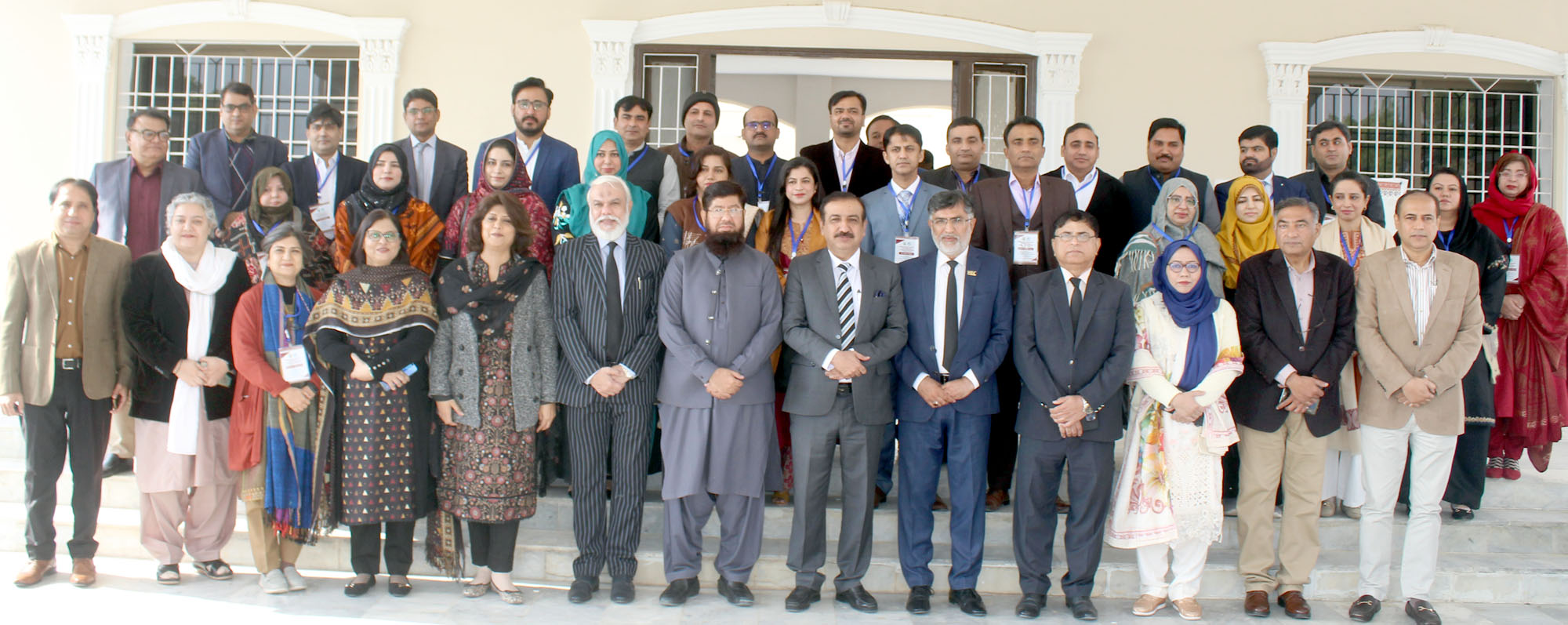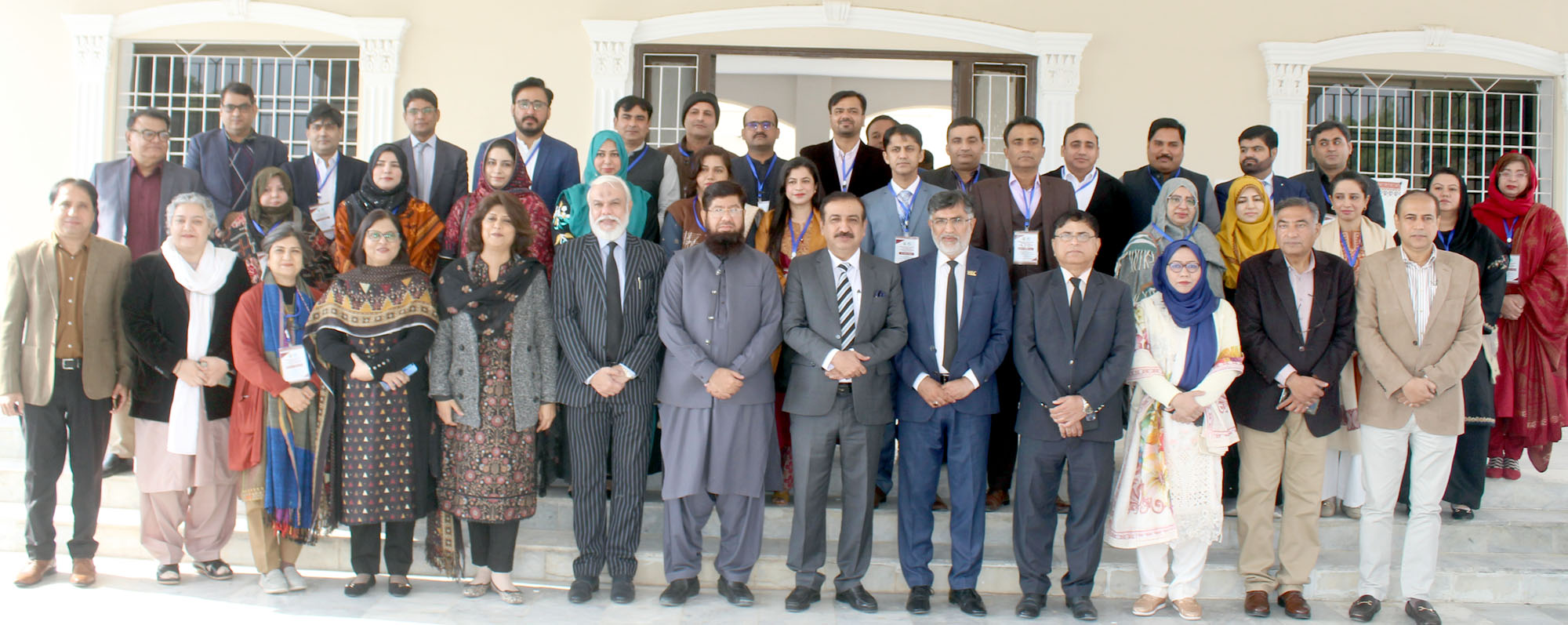.jpg)
Jews, infidels oppose Islam, not Pakistan, says Islamic scholars
The Department of Islamic Culture, University of Sindh Jamshoro organized an international symposium titled "Rising Anger and Intolerance in Pakistani Society: Causes, Effects & Solution through Islamic Teachings" at the Senate Hall on Thursday. Scholars from various parts of Pakistan and abroad shared their insights on the root causes of intolerance, its societal effects and Islamic strategies for peace building.
In his presidential address, Vice-Chancellor Prof. Dr. Khalil-ur-Rehman Khoumbati said that intolerance and the misuse of social media had become key drivers of negative behaviors in society.
“Jews and infidels are not inherently enemies of Pakistan, but their hostility arises from their enmity toward Islam,” he said.
Referring to recent tensions in the region, he remarked, “For the first time, India was shaken by the retaliatory power of Pakistan’s armed forces. In the past, flames of conflict were seen only in Muslim countries like Palestine, Lebanon, Iraq, Egypt and Syria but now the world witnessed otherwise.”
Renowned religious scholar and Director of Al-Sharia Academy Gujranwala Allama Zahid-ur-Rehman Rashidi warned that societal anger stemmed from a moral vacuum and ignorance of Islamic teachings.
“When Islamic ethics are neglected, intolerance breeds rapidly. We must teach our youth the true spirit of Islam — which is peace, dialogue and respect for diversity,” he said.
He stressed the need for Ulema to lead with wisdom and avoid politicization of religion. “Social media must be used to spread constructive knowledge rather than incite hatred,” he added.
He called for Madrassas and universities to collaborate on promoting interfaith harmony. “We are at a crossroads — we either return to the Prophet’s teachings or fall deeper into social chaos,” he concluded.
Dr. Kamal Hassan of the Department of Comparative Religion & Shariah at Al-Azhar University, Egypt said, “The Quran teaches compassion, not coercion. Unfortunately, frustration is growing because we are distancing ourselves from these values.”
He highlighted that Islamic civilization historically promoted tolerance, intellectual diversity, and justice.
“We must revive Islamic scholarship that embraces disagreement with respect,” he added.
He noted that Islamic teachings can reconcile modern challenges with ethical solutions. “Muslim societies must promote knowledge, empathy and accountability,” he asserted.
He called for bridging the gap between Islamic knowledge and public policy.
“Education systems must integrate spiritual and moral learning,” he said and added that peaceful coexistence was not just an ideal but a prophetic legacy.
Regional Director of Dawah Academy Karachi Dr. Syed Aziz-ur-Rehman noted that rising anger was linked to identity confusion and materialism. “Islam provides clarity, calm and community — the antidotes to today’s crises,” he said.
He urged the state to engage religious institutions in national harmony campaigns. “Religious literacy must be made a national priority,” he emphasized. “Only by returning to the prophetic model of patience and justice can we curb the tide of hate,” he added.
Dean of the Faculty of Islamic Studies at GC University Hyderabad Dr. Makhdoom Roshan Siddiqui said that intolerance often arose from ignorance and poor upbringing.
“Islam emphasizes self-restraint and dialogue,” he noted and urged parents and teachers to instill patience and humility in youth.
“Let’s revive the moral education component in our institutions,” he added. He praised the symposium as a timely initiative in a polarizing era.
Dr. Ali Tariq of IIU Islamabad stated that the core Islamic principle of moderation was being overlooked. “We need media reforms to curb sensationalism that fuels societal rage,” he said.
“True religious leadership promotes reconciliation, not division,” he added and called on seminaries to reform curricula with civic and ethical education.
“Islamic values of mercy and mutual respect must become part of public discourse,” he urged.
Dean Faculty of Islamic Studies, Dr. Hafiz Muhammad Sani said intolerance thrived where justice was absent.
“Restoring public trust in institutions through fairness is part of Islamic governance,” he said and added how emotional manipulation in political and religious narratives damaged social cohesion.
“Tolerance must be taught as a virtue at all educational levels,” he urged.
Dean Faculty of Islamic Culture Prof. Dr. Hafiz Munir Ahmed Khan said that moral degeneration was the root cause of anger and division.
“Islam is a religion of balance and compassion,” he said and proposed institutional collaboration to conduct nationwide tolerance awareness drives.
“A spiritual void is being filled by hostility — we must reverse that,” he warned.
Symposium convener and Chairperson of the Department of Comparative Religion & Islamic Culture Dr. Naheed Arain said the symposium aimed to reframe social challenges through an Islamic lens.
“We gathered voices from across the intellectual spectrum to identify holistic solutions,” she said and added that women scholars had a vital role in rebuilding peace narratives.
Symposium secretary and Associate Professor Dr. Hameedullah Bhutto highlighted that Islam condemned all forms of violence.
“The Prophet Muhammad (PBUH) modeled calmness even in conflict,” he said. “Our curriculum must reflect this prophetic attitude,” he added.
He also proposed workshops and teacher training on Islamic ethics. “Let’s combat extremism with critical thinking and compassion,” he said.
Dr. Maroof Bin Rauf from Karachi University stated that anger was rising due to injustice, unemployment and alienation.
“The mosque and university must join hands in offering moral guidance,” he said. “The path forward lies in ethical governance and community empowerment,” he added.
Dr. Muhammad Saeed Shaikh of Islamia University Bahawalpur said that media, family and education all play a role in the erosion or construction of social tolerance.
“Islam provides a complete framework of social harmony,” he said. “We must teach patience and respect in every home and classroom,” he said.
He said that benign leadership in religion and politics could reverse the trend of anger, proposing that “We also need a national moral charter grounded in Islamic values”.
Dr. Riaz Ahmed Saeed of NUML Islamabad said that digital misinformation and tribal mindsets fueled intolerance.
“Islamic teachings must guide both personal and collective behavior,” he said and added that dialogue, not conflict, was the Islamic path to change.
Dr. Syed Attaullah Shah Bukhari of ZABUL Karachi remarked that emotional regulation and inner peace were Islamic goals.
“Anger is not a sign of strength — restraint is,” he said. “Extremist ideologies misrepresent Islam,” he noted. “We must reclaim Islam’s peaceful identity through scholarship and dialogue,” he concluded.
The symposium concluded with a set of comprehensive recommendations, which will be compiled and submitted to the provincial and federal governments for policy formulation.
The event brought together the participants including students, faculty, researchers and clerics committed to building a more tolerant and just Pakistani society.


